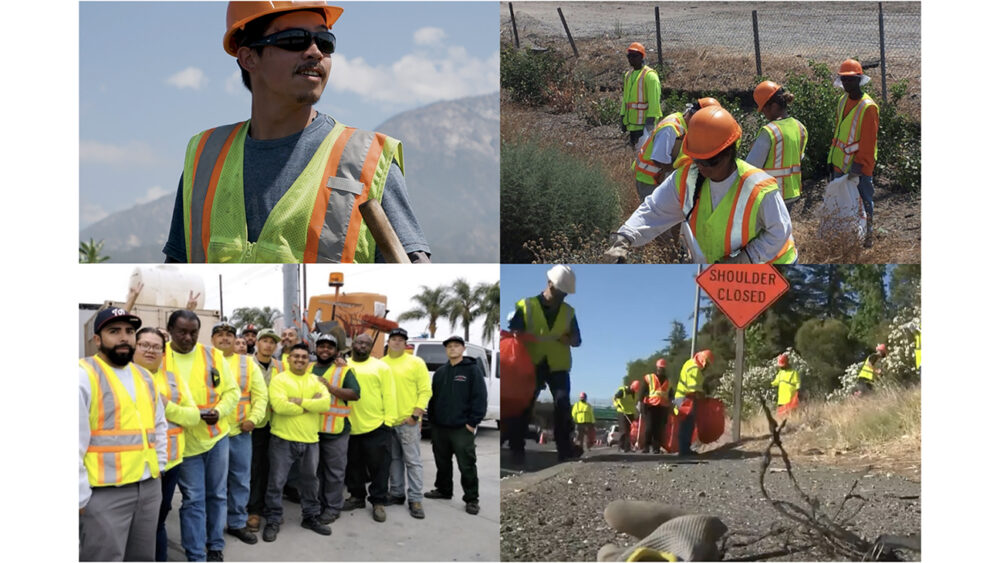Parolees face many decisions immediately after being released from prison. After incarceration, they must figure out how to re-enter society, and finding work is one of the biggest challenges they face.
 Deanna Krehbiel and Eddie Rubio with the San Bernardino Community College District (SBCCD) know this well. For the past seven years, they have been operating a transitional job re-entry program for ex-offenders, teaching them the skills needed to find and keep a job. Participant learning happens mostly on the job, through the Caltrans Parolee Work Crew Program.
Deanna Krehbiel and Eddie Rubio with the San Bernardino Community College District (SBCCD) know this well. For the past seven years, they have been operating a transitional job re-entry program for ex-offenders, teaching them the skills needed to find and keep a job. Participant learning happens mostly on the job, through the Caltrans Parolee Work Crew Program.
“To go back into society, without any assistance really is very difficult for them,” said Krehbiel, Interim Executive Director of Economic Development, Corporate Training & Technology at San Bernardino Community College District Partners With CALTRANS to Help Parolees ‘Learn How to Work Again’. “This program is really to help them learn how to work again. It’s a paid transitional employment program, so it helps them financially, as they’re coming back into society.”
This program is different from most training services delivered by the community colleges; typically colleges deliver workplace training to employees at a business site – or via Zoom. In fact, Krehbiel says, “The SBCCD is the only college district that is providing Caltrans transitional work crews training for parolees, which falls in line with their focus on serving marginalized populations and individuals with barriers to employment. We’re helping individuals re-enter our communities in a healthy pathway, reconnecting with their families, assisting with full-time employment, and contributing to the economic development of our community.”
Krehbiel points out the economic benefits for Californians. ” It costs the state $79,000 a year to incarcerate an offender. But if we can invest in them and help them obtain employment and become sustainable, we are not only changing their lives, we are saving taxpayers a huge amount of money.”
A Look at the Parolee Re-entry Program
The Caltrans Parolee Work Crew Program began in July of 2013, when the California Department of Corrections and Rehabilitation (CDCR) contracted with SBCCD to operate two work crews as part of a transitional program for high-risk parolees. Caltrans funds CDCR, which in turns contracts with SBCCD to run the program.
“It’s a competitive program – the waiting list is long – that accepts parolees who are fully committed to turning their lives around. Recidivism data indicates that while participating in the Caltrans Parolee Work Crew Program and obtaining partner wraparound services, only 3 percent of the program participants go back to prison”, Krehbiel said. In a recent three-month period, nine participants were placed in full-time employment.
Participants report to work at 6:30 a.m. and are transported to tend to beautifying California’s highways. Five days a week, they pick up trash and litter, remove weeds, trim and clear trees, fix broken sprinklers and clean sewer drains. “A lot of learning happens on the job,” Rubio said. Supervisors find teachable moments to deliver lessons in communication skills and message delivery, among other soft skills needed to succeed in the workplace.
Participants meet their conditions of parole by attending mandatory classes, such as anger management, substance abuse and career development, offered through program partner Cal State San Bernardino Reentry Initiative (CSRI) . Participants have the option to utilize one day of the week to take these classes and/or job search.
When participants are near the end of their 90 days program staff begin to write letters of recommendation, share employment leads and help participants with resume-writing and interview skills. Each program participant receives a suit to use for interviews and goes through interviewing preparation.
San Bernardino Community College District Partners With CALTRANS to Help Parolees ‘Learn How to Work Again’ Offers Offenders a Range of Training Programs that Enhance Skills
A major advantage of SBCCD administering the Caltrans Parolee Work Crew program is that participants have training opportunities beyond the on-the-job skills they gain through serving on the work crew. Upon available funding, SBCCD leverages programs from other grants and contracts to assist participants with training for careers such as welding, warehouse logistics, and entry-level construction. Participants earn industry-recognized certificates that help them find jobs in a career that pays above minimum wage – and they make a valuable connection with a community college, giving them the confidence they need to continue their education in the future.
“This is what sets us apart from our peers out there,” Krehbiel said.
Krehbiel and Rubio have managed to keep the program running safely through the COVID-19 pandemic. While the primary focus of the program is equipping parolees with workforce skills, their work also includes helping them address issues in other areas of their lives that may serve as barriers to long-term employment by referring them to partners who provide wraparound services.
“We look at it as more of a holistic approach, much more than just employment and placement,” Rubio said. “It’s more helping them deal with whatever issues they’re going through. Our program gives them that training to slowly work themselves into the community.”
About UpSkill California
The UpSkill California consortium is composed of more than 30 California Community Colleges that deliver customized employee training and workplace education via Workforce Training & Development Centers (WTDC). The Centers receive support from the Employment Training Panel (ETP)—a state agency that provides funding to employers to assist in upgrading the skills of their workers through training. ETP funding helps off-set the costs of job skills training necessary to maintain high-performance workplaces.
To help businesses manage and administer the complexities of ETP contracts, several of our college members are designated as Multiple Employment Contract (MEC) holders. Those colleges also assist other consortium members in procuring ETP contracts for their clients, thus expanding the geographic area served by ETP. Colleges that are MECs are identified in the list below. Non-designated colleges subcontract with MEC colleges to procure ETP funding for their clients.
Find the Workforce Training & Development Center in your region.



Comments are closed.